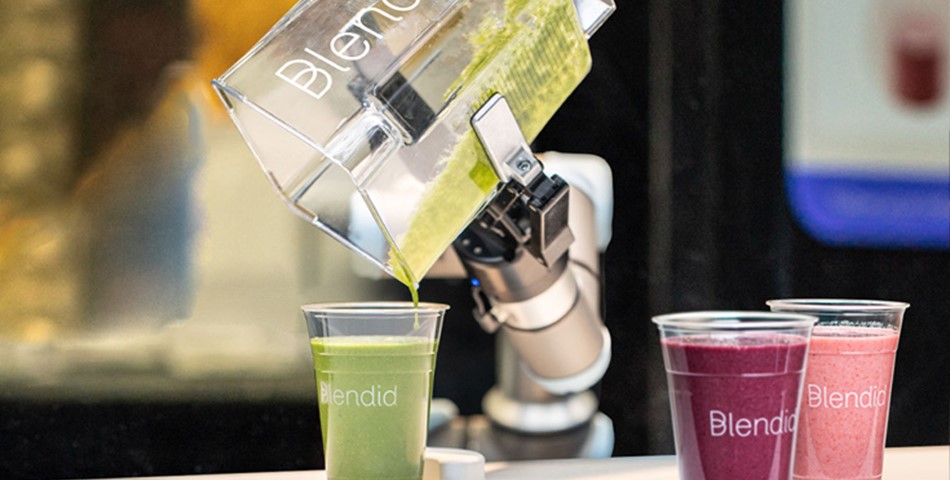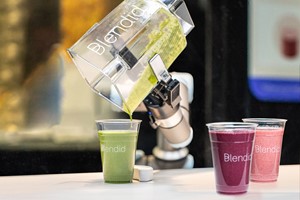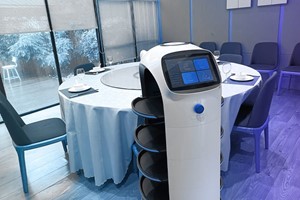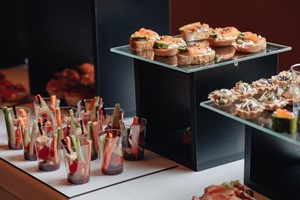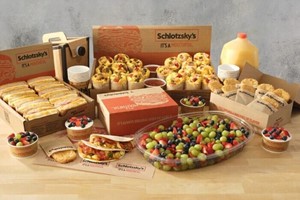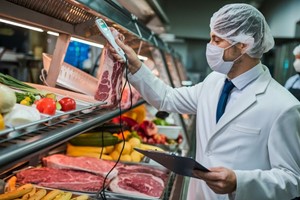Vipin Jain remembers the days when vending machine options were rather limited.
Hungry diners could maybe find a bag of chips, can of soda or granola bar, but nothing that was fresh or the makings of a more substantial meal. Jain, the CEO and co-founder of Blendid, an automated smoothie kiosk, had a bigger vision for the future. He was inspired by a machine featured in the TV franchise “Star Trek”—the replicator, which made food exactly to a person's preferences each time.
“I wanted to make a replicator. So, we started the company,” Jain said. “We had a very simple mission, and that was to make food and to make food available to the way you like it, anytime of the day, anywhere you are.”
Blendid now has 12 units across the U.S. in places such as college campuses and hospitals. The company is planning to add new units every month throughout the next year. But Jain’s vision for the future doesn’t stop expanding the concept. His team is working on developing new offerings, and he envisions food service being fully automated in some noncommercial venues.
“We do want to create a future that in four years, five years from now, when you walk into hospital, you walk into a college area, you walk into an airport, you have a completely autonomous robotic food court,” he said. And that’s not all. He envisions a system that can greet guests by name and offer up their usual orders with their specific food preferences.
Fresh Food Options
A close cousin to the micromarket, but with an even smaller footprint, smart vending has been taking the industry by storm in recent months. Last year, Subway, for instance, launched a smart fridge suitable for places like airports and hospitals.
Meanwhile, many college campuses have been leveraging automated experiences for diners. The new Convenience Corridor at Lehigh University offers salads, ramen bowls and even sushi, powered by robots and vending, while Suffolk University launched four new automated foodservice concepts this semester—Farmer’s Fridge, Costa Coffee, Pepsi Snack Vending and Smart Market.
And the food options range more widely, with everything from smoothies, such as the ones offered by Blendid, to hot meals from brands like Wao Bao. Last year, the Asian bao chain teamed up with Automated Retail Technologies to offer its food in a hot-vending format.
Automated Retail Technology operates just over 250 machines throughout the country—and Wao Bao is an option in almost of them, with a handful offering strictly Wao Bao products. And the tech behind the machine is advanced-diners can order on their phones and even schedule a pick-up time.
“I mean, these are not like the mom-and-pop vending machines that I grew up with, where they're filled with a Snickers bars and bags of chips that have been sitting there for God knows how long,” said Geoff Alexander, president and CEO of Wow Bao. “These machines allow you to order ahead and scan your QR code on your phone and makes your food to that time.”
Blendid’s Jain notes that smoothies are a difficult food to automate, as a mix of fresh ingredients with different moisture levels can be tough to perfect. But it was the complexity of creating smoothies that pushed Jain in that direction.
“We wanted to pick a category that was complex enough that we could build confidence that we can automate food for the future,” he said. “You need to maintain taste and texture. For the smoothie, you have to be very precise, because if it was too thin, it won’t taste good or if it’s too thick, it won’t pull. It has to have the right chemistry.”
LBX Robotics, another automated vending concept, is unique in that it doesn’t actually sell its own food. Instead, it works with brands, such as restaurant chain Slices, to create a personalized menu full of that concept’s own products.
LBX got its start baking bread, but its machines can be tailored to prepare anything from pizza to cupcakes and cookies. It currently has over 100 kiosks in locations like hospitals and college campuses. And the customization doesn’t end at the menu—customers are able to brand the machines to their liking.
“Part of our go-to-market is not to push and promote only LBX Robotics, that’s not the main thing,” said Benoit Herve, the company’s CEO and founder. “And so, we will rebrand the entire machine with their brand and that way for them. It's an extension of their existing brick-and-mortar restaurant.”
Labor, Labor, Labor
The obvious operational challenge automated tech seeks to solve is labor. Wow Bao’s Alexander attributes recent growth in the smart vending segment in part to the pandemic, which significantly altered the labor pool.
“I think we're coming out of the pandemic—the labor force has changed, number one. So this is a lower labor opportunity,” said Alexander.
Blendid’s automated smoothie kiosks only require two hours of labor a day and need to be serviced just once—for restocking and cleaning. The robot takes care of the rest and can run for 22 hours.
“So now when you have this ability, where you're not struggling to hire people to make food for you all day, I think it reduces the stress, the knock on the operator,” said Jain. “Both in terms of just the difficulty of hiring and then managing and stressing about the job.”
Herve shares a similar philosophy, noting that “a machine usually isn’t sick. It usually is never on strike. So, it brings additional benefits for all of us.”
In addition, Jain said in many cases the Blendid robot has had an impact on team morale.
“We have nurses and doctors who are working in very stressful environments, extended hours at times. And it's all gloom and doom. But this robot and this motion and there's energy around it,” he said. “It just brings a sense of optimism about the future.”
Additional Appeal
Another benefit of next-generation vending machines is their ability to collect customer data.
And many of those consumers, particularly those who frequent noncommercial venues, are looking for more varied options at all times of day.
“You have a 24/7 customer base, and the actual food items on campus are not always available,” said Alexander. “And by having a 24/7 machine that can serve hot food, it becomes a huge opportunity for the client.”
The tech-forward nature of the concepts may further their appeal to younger diners.
“The whole experience of digital appeals to millennials and Gen Z. It's very natural for them to use an all-digital experience where they can use their phone,” Jain said. “They can decide what they want to consume, how they want to personalize it.”
By Reyna Estrada




